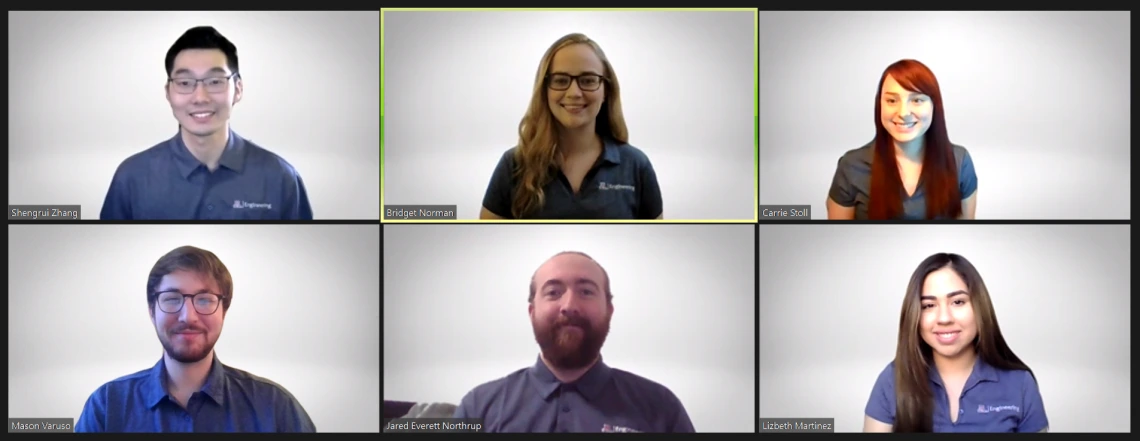Determined Students Design Radio Telescope for Steward Observatory

Team 21039. Top row: Shengrui Zhang, Bridget Norman and Carrie Stoll. Bottom row: Mason Varuso, Jared Northrup and Lizbeth Martinez
Project Title: Public Outreach Radio Telescope
Team 21039 Members:
Bridget Norman, systems engineering
Lizbeth Martinez, mechanical engineering
Jared Northrup, mechanical engineering
Carrie Stoll, electrical and computer engineering
Mason Varuso, optical sciences and engineering
Shengrui Zhang, electrical and computer engineering
Sponsor: UA Department of Astronomy & Steward Observatory
Team 21039 is going to great lengths to design a radio telescope, or a telescope that studies radio frequencies rather than light. The telescope, which will sit atop Steward Observatory, is based on existing hardware from a 1997 project known as the “Student Radio Telescope.” It will allow faculty, students and community members to study celestial objects like the sun and moon, and to analyze smaller or more distant objects in the future.
The student team has faced and overcome many obstacles – such as drafting more than 200 designs and checking dozens of pieces of existing hardware to see what needed to be replaced.
But Mason Varuso, a senior in optical sciences and engineering, said the biggest challenge was finding a 20-year-old computer password to access files about the original 1997 telescope.
“It took weeks of searching, but we finally found it on a yellowed piece of paper hidden under a stack of hundreds of other papers on a shelf eight feet off the ground,” he said.
Lessons in Real World Engineering
Bridget Norman, systems engineering student and team leader, acknowledged the complexity of the project, including timing of deliverables and working within a budget. She split the team in two to tackle the challenge – one focused on mechanical and optical designs and one focused on computer and electrical designs. She has learned to facilitate communication to keep everyone on the same page.
“This team has been one of the best groups I have ever worked with,” she said. “Everyone has gone above and beyond putting in many more hours than expected for the capstone, since we are all eager to complete our goal of building an awesome radio telescope.”
A Commitment to STEM and the Community
The student team focused on solid design, safety and ease of use. Students configured the graphical user interface so that the user need only input coordinates to point the radio telescope in the right direction. They hope easy use will encourage people in the local community to learn about radio astronomy, which is not as well-known as observational astronomy and optical telescopes.
“This will be a cool asset for the university and community and hopefully increase public interest in radio astronomy, STEM and space sciences” said Varuso.
The final telescope design is 15 feet tall and weighs more than 1000 pounds. Now the team is on debugging and improving the performance of the electrical system, while also getting quotes from fabricators. School won’t be in session long enough for them to install the telescope, so others at Steward will take over that job.
Students Match Professional Benchmarks
Justin James Hyatt, senior research associate for Steward Observatory and the team’s mentor, has been impressed with their tenacity. He said that when they originally completed the design to meet safety standards, the dish design was too heavy. But they just kept moving forward with a redesign to reduce the dish width from 3 meters to 2.4 meters.
“I am working on a similar project of larger scale with a German engineering company, and the capstone team has shown that they are on par with professionals,” said Hyatt.

